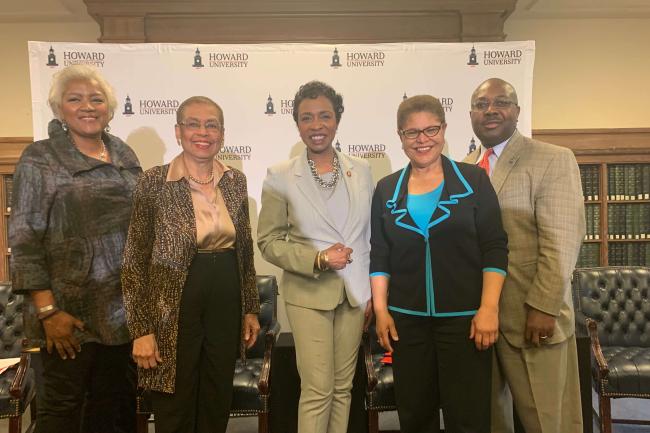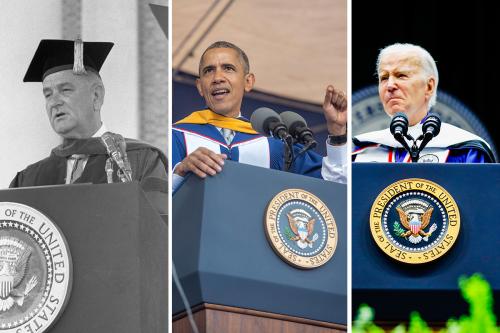WASHINGTON (April 1, 2019) – The Gwendolyn S. and Colbert I. King Endowed Chair in Public Policy Lecture Series continued this week with a celebration of women in politics, from activism to advocacy. The 2018-2019 King Lecture Series Chair, Donna L. Brazile, moderated a conversation to a packed house in the Founders Library Browsing Room, featuring U.S. Congresswoman Eleanor Holmes Norton, Congresswoman Karen Bass and Congresswoman Yvette Clarke. Howard University President Dr. Wayne A. I. Frederick opened the event with an ode to the women deans of the University’s 13 colleges and schools, before acknowledging the King’s commitment to the University and Brazile’s proven track record of leading necessary and robust discussions, on campus.
“It is my great honor to welcome each and every one of you here to celebrate Women’s History Month,” Brazile says. “We celebrate women of courage and women who’ve made a difference in our lives. The three women here today are not only my friends and my mentors, they have all made a difference in the lives of so many Americans.”
Congresswoman Norton, now in her 15th term as congresswoman for the District of Columbia, spoke on gentrification and D.C. statehood, among a list of topics posed by Brazile or student attendees. While discussing the start of her political career, Brazile questioned Congresswoman Norton about a series of events involving Fannie Lou Hamer, a prominent voting and women’s right activist and leader of the civil rights movement. She says it all started while visiting Mississippi as a member of the Student Nonviolent Coordinating Committee, a now-defunct civil rights organization that emerged from student sit-ins during the 1950s and 1960s.
“When I arrived to the frontlines of the civil rights movement, in Mississippi, I was told that Fannie Lou Hamer had just been arrested. All the other activists were younger than me and looked to me for guidance, although I had only been there about five minutes,” says Congresswoman Norton. “I was only a second-year law student and couldn’t pretend to be a lawyer.”
But she was able to use her status as a law student to demand justice. After contacting the police chief in Greenwood, Mississippi, where she was located, and requesting him contact officials in Winona, Mississippi about Hamer’s arrest, she traveled to Winona to ensure their wellbeing. Two days later, Hamer was released from jail.
Congresswoman Bass was re-elected in November 2018 to her fifth term representing the 37th Congressional District of California and currently serves as the leader of the Congressional Black Caucus, a contingent of African American members of U.S. Congress. She is the first African American woman in the country to serve as Speaker of a State Assembly. Pivoting back to the theme of activism to advocacy, Brazile asked Congresswoman Bass to describe her path to public service.
“It’s the time period in which I grew up, which to me, is similar to the time period we’re currently in,” says Congresswoman Bass. “There’s a heightened awareness about politics – even children know about politics now and know who the president is. That’s how I grew up. But, I never thought about running for office. I was an activist doing work with the anti-apartheid movement, the police movement and all of the issues that were impacting our community.”
She went on to discuss a non-profit organization she formed at the height of the crack cocaine epidemic, to address the convergence of crack cocaine, gang violence and deindustrialization. While fighting to hold liquor stores, motels and other focal points for drug trafficking accountable, Congresswoman Bass says she was tipped off by her soon-to-be predecessor, Congresswoman Diane Watson, to move her advocacy efforts from a grassroots organization, to the state legislator.
“Because I was working in the community, when it was time that I got pushed to run, it was a little easier because I had already had a base over many, many years,” she says.
Congresswoman Clarke also knows the importance of grass roots organizing, having been an activist and community organizer before becoming a legislator. Before being elected to the House of Representatives, she served on the New York City Council, succeeding her mother, Una S. T. Clark, Ph.D., and making them the first mother-daughter succession in the history of the City Council. She currently represents New York’s Ninth Congressional District, where she has dedicated herself to continuing a legacy of excellence established by the late Honorable Shirley Chisholm, the first Black woman elected to Congress.
“Shirley Chisholm was a contemporary of my mom. They both did a lot of community organizing together. Because I was a child at the time, I was at every meeting with them. That was my childcare at the time,” explains Congresswoman Clarke, going on to say, because she was in that space, she was able to grow a genuine interest for public service and simply doing the right thing.
To close the event, the panelists were presented with questions by Howard University student attendees. The next installment of the 2018-2019 Gwnedolyn S. and Colbert I. King Endowed Chair in Public Policy Lecture Series is scheduled for Thursday, April 4, beginning at 5 p.m., inside the Founders Library Browsing Room. The Fierce Urgency of Now, will feature Letitia A. James, newly elected Attorney General of New York and Howard University alumna. For more information on the King Lecture Series, contact KingLectureSeries@Howard.edu.
###
Photograph above: (L-R) - Donna L. Brazile, 2018-2019 King Lecture Series Chair, U.S. Congresswoman Eleanor Holmes Norton, U.S. Congresswoman Yvette Clarke, U.S. Congresswoman Karen Bass and Anthony K. Wutoh, Provost & Chief Academic Officer
About Howard University
Founded in 1867, Howard University is a private, research university that is comprised of 13 schools and colleges. Students pursue studies in more than 120 areas leading to undergraduate, graduate and professional degrees. The University operates with a commitment to Excellence in Truth and Service and has produced four Rhodes Scholars, 11 Truman Scholars, two Marshall Scholars, one Schwarzman Scholar, over 70 Fulbright Scholars and 22 Pickering Fellows. Howard also produces more on-campus African-American Ph.D. recipients than any other university in the United States. For more information on Howard University, visit www.howard.edu.





